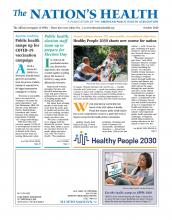Social media can have negative impacts on people’s vaccine attitudes and behaviors, a new study finds. However, real-life discussions with friends and family may help to eliminate those negative effects.
The findings, published in August in Vaccine, are based on data related to flu vaccinations, but offer important lessons for addressing vaccine hesitancy in the eventual immunization campaign against COVID-19.
To conduct the study, researchers examined more than 115,000 tweets about the flu and vaccination, along with survey data collected from about 3,000 U.S. adults between September 2018 and May 2019. Tweets were tracked on topics such as vaccine science, negative consequences of vaccination, vaccine fraud and children, and anti-vaccination.
Overall, the study found a strong association between three topics — vaccine science, fraud and “big pharma” — and vaccine attitudes and behaviors among survey respondents. The data also show that having real-life discussions about flu immunization with family members and friends appeared to mitigate the negative effects that the topics had on people’s attitudes and behaviors.
Kathleen Hall Jamieson, PhD, a co-author of the study and director of the Annenberg Public Policy Center at the University of Pennsylvania, said the findings are a timely reminder that the “social media world matters” in preparing for an eventual COVID-19 vaccine and creating the messaging around its rollout.
“Social media interactions can be problematic,” she told The Nation’s Health. “We need to be aware that people are online engaging in like-minded networks in which misinformation is being normalized. But we also need to remember that engaging in real-life discussions in our own communities can be corrective.”
With public polling already showing worrisome rates of hesitancy about a COVID-19 vaccine — especially in communities hit disproportionately hard by the virus — Jamieson said increasing people’s understanding of how vaccines work and partnering with trusted messengers will be key to reducing people’s vulnerability to vaccine misinformation. Health advocates should create a context of understanding in real life and on social media, she said.
“Public health at the local level needs to engage people already trusted in the community, they need to talk through people that communities are already listening to,” Jamieson said. “Community trust in those at the local level will be indispensable.”
For more information on the study, visit www.journals.elsevier.com/vaccine.
- Copyright The Nation’s Health, American Public Health Association









